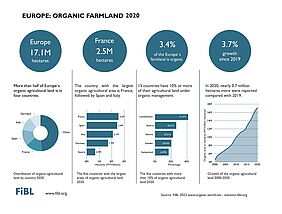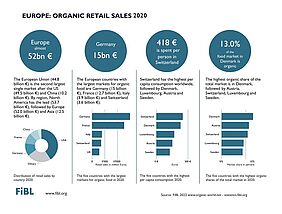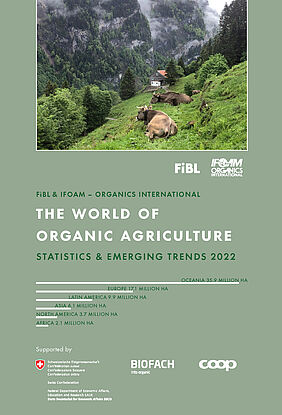In 2020, 17.1 million hectares of farmland in Europe were organic (European Union: 14.9 million hectares). With almost 2.5 million hectares, France became the new number one country in terms of farmland under organic management, followed by Spain (2.4 million hectares), Italy (2.1 million hectares) and Germany (1.7 million hectares).
Organic farmland increases by 0.7 million hectares
Organic farmland increased by over 0.7 million hectares in the European Union, representing an increase of 5.3 percent. Growth was, however, lower than in the previous year. France reported 307’000 hectares more than in 2019, Italy had over 102’000 hectares more, and Germany had over 88’000 hectares more.
Liechtenstein has the highest organic share of the total farmland in the world
In 2020, organic farmland in Europe constituted 3.4 percent of the total agricultural land and 9.2 percent in the European Union. In Europe (and globally), Liechtenstein had the highest organic share of all farmland (41.6 percent), followed by Austria, the country in the European Union with the highest organic share (26.5 percent). Fifteen European countries reported that at least 10 percent of their farmland is organic.
Organic producers, processors and importers: Modest growth
There were almost 420’000 organic producers in Europe and almost 350'000 in the European Union. Italy had the largest number (71’590).
There were 84’799 processors in Europe and over 78’000 in the European Union. Over 6’800 importers were counted in Europe and almost 5‘800 in the European Union. The country with the largest number of processors was Italy (nearly 23‘000), while Germany had the most importers (more than 1’900).
Retail sales reach € 52.0 billion
Retail sales in Europe were valued at € 52.0 billion (€ 44.8 billion in the European Union). The largest market was Germany (€ 14.99 billion). The European Union represents the second largest single market for organic products globally after the United States (€ 49.5 billion).
Record growth of retail sales in 2020
The European market reached a record growth rate of 14.9 percent, the highest in the last decade. Among the key markets, the highest growth was observed in Germany (22.3 percent). In 2020, the organic markets in many countries exhibited double-digit growth due to the pandemic as people stayed home and began to cook more often. Health, environment and climate change have become important issues. If this trend continues, production and processing have to keep pace. The Farm to Fork strategy of the European Union can support this development with respective measures.
European consumers spend more on organic food
In Europe, consumers spent € 63.3 on organic food per person annually (European Union: € 101.8). Per capita, consumer spending on organic food has doubled in the last decade. In 2020, Swiss and Danish consumers spent the most on organic food (€ 418 and € 384 per capita, respectively).
Denmark has the highest organic market share in the world
Globally, European countries account for the highest shares of organic food sales as a percentage of their respective food markets. Denmark has the highest organic food sales share worldwide, with 13.0 percent in 2020, followed by Austria with a share of 11.3 percent and Switzerland with 10.3 percent.
FiBL and AMI conducted the survey on organic farming in Europe. The FiBL data collection was carried out in the framework of the global survey on organic farming supported by the Swiss State Secretariat for Economic Affairs (SECO), the Coop Sustainability Fund, NürnbergMesse and IFOAM – Organics International.
Further information
Contact
For questions about organic data
- Helga Willer, FiBL, Ackerstrasse 113, 5070 Frick, Switzerland
- Diana Schaack, Agricultural Market Information Company (AMI), Dreizehnmorgenweg 10, 53175 Bonn, Germany
+49 228 33805-0, diana.schaack(at)ami-informiert.de, www.ami-informiert.de
Download, infographics and online databases
- fibl.org: "The World of Organic Agriculture 2022" PDF version
- organic-world.net: Download "The World of Organic Agriculture 2022"
- organic-world.net: Infographics
- statistics.fibl.org: FiBL statistics on organic agriculture worldwide
Links
- fibl.org: Website of FiBL, the Research Institute of Organic Agriculture
- ami-informiert.de: Website of AMI, the Agricultural Market Information Company
- biofach.de: Website of BIOFACH
"The World of Organic Agriculture – Statistics and Emerging Trends" on February 15, 2022 (online) – Joint session of FiBL, IFOAM – Organics International and the BIOFACH organic trade fair.
Tuesday, 15 February 2022, 12:00 to 1:00 pm CET
- Louise Luttikholt, IFOAM – Organics International: Introduction and presentation of program and speakers, Moderator
- Helga Willer, FiBL: Overview on global figures, importance of statistics
- Xhona Hysa, IFOAM – Organics International: Global overview on policies and regulations
- Eduardo Cuoco, IFOAM Organics Europe: Developments in Europe, linking market figures to policies
- Amarjit Sahota, Ecovia Intelligence, UK: The global market for organic food
- biofach.de: Registration
- biofach.de: Further information






